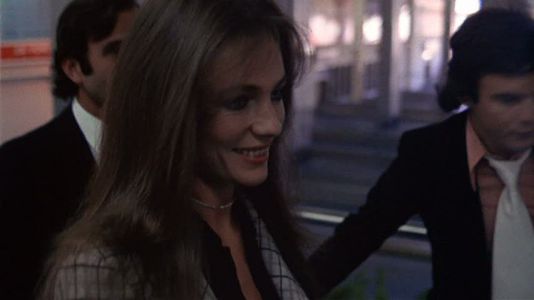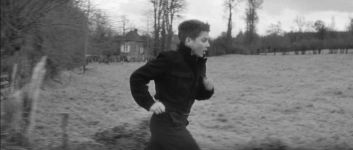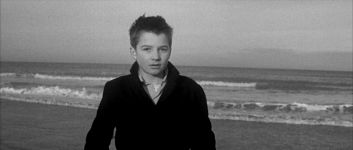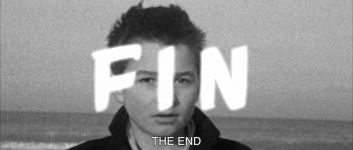Difference between revisions of "JCM312/French New Wave II: François Truffaut (Discussion)"
From Screenpedia
Jump to navigationJump to search (added Ferrand's books) |
|||
| (One intermediate revision by the same user not shown) | |||
| Line 1: | Line 1: | ||
*Monaco sees Truffaut's films as being like "mosaics." What does he mean by this and is it evident in <i>Day for Night</i>? | *Monaco sees Truffaut's films as being like "mosaics." What does he mean by this and is it evident in <i>Day for Night</i>? | ||
*Monaco sees two key questions recurring in Truffaut's films, one of which is "Are women magic?" What does Monaco think the answer is? Explain. | *Monaco sees two key questions recurring in Truffaut's films, one of which is "Are women magic?" What does Monaco think the answer is? Explain. | ||
| − | *Monaco refers to Alphonse and Ferrand, in <i>Day for Night</i>, as ''homo cinematicus''. What do you think he means by that? It leads into Alphonse's question, "Are films more important that life?" What does Monaco think the answer is? Explain. | + | *Monaco refers to Alphonse and Ferrand, in <i>Day for Night</i>, as ''homo cinematicus''. What do you think he means by that? It leads into Alphonse's question, "Are films more important that life?" What does Monaco think the answer is? Explain. (See [https://tvcrit.org/Classes/Jbutler/T340/DayForNight_FerrandsBooks/index.php Ferrand's books].) |
*Monaco argues in reference to the white frames cut into ''Day for Night'' just before Julie arrives that "...it is the structure of the film that speaks, not the content." What do you think he means by that? | *Monaco argues in reference to the white frames cut into ''Day for Night'' just before Julie arrives that "...it is the structure of the film that speaks, not the content." What do you think he means by that? | ||
| Line 18: | Line 18: | ||
*According to Monaco, what fascinates Truffaut about the world of children? Truffaut has said, "Morally, the child is like a wolf..." What do you think he means by this and is it evident in <i>The 400 Blows</i>? | *According to Monaco, what fascinates Truffaut about the world of children? Truffaut has said, "Morally, the child is like a wolf..." What do you think he means by this and is it evident in <i>The 400 Blows</i>? | ||
*Monaco sees Truffaut's films as being like "mosaics." Is this evident in <i>The 400 Blows</i>? | *Monaco sees Truffaut's films as being like "mosaics." Is this evident in <i>The 400 Blows</i>? | ||
| − | *What does Monaco mean by the "considered pan" ([https:// | + | *What does Monaco mean by the "considered pan" ([https://vimeo.com/365304833 view clip]? How does he interpret the final shot of ''The 400 Blows''? |
*Truffaut was a known admirer of Jean Vigo's films. What similarities do you see between ''The 400 Blows'' and Vigo's ''Zero for Conduct''? | *Truffaut was a known admirer of Jean Vigo's films. What similarities do you see between ''The 400 Blows'' and Vigo's ''Zero for Conduct''? | ||
*The characters Jean-Pierre Léaud plays in ''The 400 Blows'' and ''Day for Night'' have different names (Antoine and Alphonse, respectively), but one could still connect the two. That is, what elements of the two films suggest that Antoine might have grown up to become Alphonse? | *The characters Jean-Pierre Léaud plays in ''The 400 Blows'' and ''Day for Night'' have different names (Antoine and Alphonse, respectively), but one could still connect the two. That is, what elements of the two films suggest that Antoine might have grown up to become Alphonse? | ||
Latest revision as of 14:28, 10 October 2019
- Monaco sees Truffaut's films as being like "mosaics." What does he mean by this and is it evident in Day for Night?
- Monaco sees two key questions recurring in Truffaut's films, one of which is "Are women magic?" What does Monaco think the answer is? Explain.
- Monaco refers to Alphonse and Ferrand, in Day for Night, as homo cinematicus. What do you think he means by that? It leads into Alphonse's question, "Are films more important that life?" What does Monaco think the answer is? Explain. (See Ferrand's books.)
- Monaco argues in reference to the white frames cut into Day for Night just before Julie arrives that "...it is the structure of the film that speaks, not the content." What do you think he means by that?
The 400 Blows questions
- According to Monaco, what fascinates Truffaut about the world of children? Truffaut has said, "Morally, the child is like a wolf..." What do you think he means by this and is it evident in The 400 Blows?
- Monaco sees Truffaut's films as being like "mosaics." Is this evident in The 400 Blows?
- What does Monaco mean by the "considered pan" (view clip? How does he interpret the final shot of The 400 Blows?
- Truffaut was a known admirer of Jean Vigo's films. What similarities do you see between The 400 Blows and Vigo's Zero for Conduct?
- The characters Jean-Pierre Léaud plays in The 400 Blows and Day for Night have different names (Antoine and Alphonse, respectively), but one could still connect the two. That is, what elements of the two films suggest that Antoine might have grown up to become Alphonse?
Bibliography
- James Monaco, The New Wave (NY: Oxford University, 1976), 13-36, 87-97.




